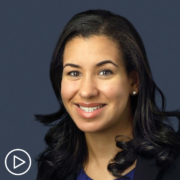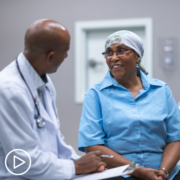HCP Roundtable: Breaking Barriers and Cultivating Clinical Excellence in Endometrial Cancer Care
HCP Roundtable: Breaking Barriers and Cultivating Clinical Excellence in Endometrial Cancer Care from Patient Empowerment Network on Vimeo.
What are obstacles faced by healthcare providers (HCPs) treating endometrial cancer patients and families? How can HCPs foster a culture of innovation and continuous improvement in clinical practice? Dr. Radhika Gogoi of Karmanos Cancer Institute and Dr. Charlotte Gamble of MedStar Health unravel the complexities of endometrial cancer care, providing HCPs with the insights and tools needed to navigate challenges effectively and to deliver optimal care to their patients and families.
See More from EPEP Endometrial Cancer
Related Resources:
Transcript:
Dr. Nicole Rochester:
Welcome to this Empowering Providers to Empower Patients or EPEP Program. I’m Dr. Nicole Rochester, founder and CEO of Your GPS Doc. EPEP is a Patient Empowerment Network program that serves as a secure space for healthcare providers to learn techniques for improving physician patient communication and to overcome practice barriers. In this endometrial cancer healthcare provider roundtable, we are discussing breaking barriers and cultivating clinical excellence in endometrial cancer care.
This program aims to improve healthcare provider awareness of screening and access disparities to specialized care in endometrial cancer, while also addressing solutions to overcome practice barriers such as lack of awareness, outdated practices, and inertia. Today, we’ll talk about some of the complexities of endometrial cancer care and we’ll provide healthcare providers with the insights and tools needed to navigate challenges effectively.
Our discussion will cover enhancing healthcare provider awareness of diagnostic and access disparities to specialized care in endometrial cancer, actionable strategies to overcome practice barriers in endometrial cancer care and empowering providers through fostering a culture of innovation and continuous improvement in clinical practice.
It is my privilege to be joined by Dr. Radhika Gogoi from Karmanos Cancer Institute. Dr. Gogoi is a dedicated clinician and cancer researcher focused on exploring the Hippo pathway in gynecologic cancers, aiming to uncover novel therapeutic approaches. Thank you so much for joining us today, Dr. Gogoi.
Dr. Radhika Gogoi:
Thank you, Dr. Rochester, and thank you for having me. It’s great to be here.
Dr. Nicole Rochester:
It’s also my honor to be joined by Dr. Charlotte Gamble, gynecologic oncologist at MedStar Washington Hospital Center and MedStar Southern Maryland Hospital. Dr. Gamble is dedicated to taking care of patients who have historically been marginalized and are vulnerable to poor health outcomes. Her research examines the role of safety net hospital systems in gynecologic cancer care. Thank you so much for joining us today, Dr. Gamble.
Dr. Charlotte Gamble:
Thank you so much for having me. It’s a pleasure to be here.
Dr. Nicole Rochester:
So we’re going to start today’s discussion by diving into enhancing healthcare provider awareness of diagnostic and access disparities in endometrial cancer care. And I want to start by just framing the current situation. Black women are twice as likely to die from endometrial cancer when compared to their white women counterparts.
There is no current screening test for endometrial cancer, and diagnosis is usually made after patients present with symptoms. Sadly, the list doesn’t end there. So I’m going to start with you, Dr. Gogoi. What are the primary barriers to accessing specialized care for endometrial cancer that you’ve observed in your practice and perhaps in others?
Dr. Radhika Gogoi:
So thank you for that question. I guess I just want to start by just level setting a little bit and talking about specifically endometrial cancer disparities. So unlike other gynecologic cancers, which actually have been shown to be decreasing in incidence, endometrial cancer is actually one of the cancers that is increasing. We know that low grade endometrial cancers really have an excellent prognosis, but higher grade endometrial cancers really have a much poorer prognosis.
And that’s the specific subgroup that seems to be increasing in all women. Black women, again, as you mentioned, have the lowest survival rate, and that is even when corrected for the specific type of endometrial cancer and the stage of endometrial cancer. So with that sort of background and problem, the question really becomes how do we allow and educate our patients about the barriers that they face when accessing specialized care?
And so some of the barriers, at least that I’ve noticed, and certainly in the hospital that I practice in is really as you pointed out, that there is no good current screening test. Black women tend to have a delayed onset from the time of their symptoms, which in this case is really postmenopausal bleeding to actually obtaining a diagnosis.
And there are studies that have shown that some of that is education or there is an understanding that perhaps postmenopausal bleeding is not as significant an issue, doesn’t lead necessarily, to obtaining healthcare which as you can appreciate then delays the onset of the diagnosis. There is also that Black women present with more advanced disease. This is, again, likely due to the delay in diagnosis and the delay from diagnosis to getting treated.
Dr. Nicole Rochester:
Thank you. Thank you, Dr. Gogoi for level setting and for getting us started with a better understanding of those disparities. And I’d love to go to you, Dr. Gamble. In your experience, what are the primary barriers to addressing specialized care for endometrial cancer?
Dr. Charlotte Gamble:
Yeah, thank you so much. I’ll just add some additional context. I think there are so many places in which these barriers can happen. So as Dr. Gogoi alluded to, sometimes that can happen at the patient level due to just not recognizing that having irregular, unpredictable bleeding, bleeding after menopause, bleeding even before menopause has happened, but really heavy bleeding or heavy periods that any sort of abnormal, heavy irregular bleeding is not normal and has to be evaluated in a timely fashion. But that’s at the patient level.
And sometimes, people have competing priorities where they might recognize that it’s a problem but not be able to make it to their doctor’s office. Have other kinds of things that are happening in their day-to-day lives where they just are not able to prioritize their own health. We also see then how the system can affect that.
If someone hasn’t had a gynecologist in years, or their gynecologist said, bye, you don’t need to see me anymore because you’re over the age of 65, you no longer need pap smears and they’ve fallen out of care, or patients who don’t have health insurance or patients who live really far away from their doctors. Accessing the healthcare system in the year of our Lord 2024 is actually really, really hard. If you lack the resources or lack the wherewithal to navigate that.
Additionally, what we see on the healthcare standpoint is that maybe patients do actually access the healthcare system. They call the gynecologist’s office. They call their primary care doctor, and they’re told by an admin staff or someone else that hears them, but that says, okay, fine, we’ll get you in, but it’s going to be in about three-and-a-half months.
And so sometimes those barriers and those delays come from the health system in general, which is also a challenge. And then even after they present to their doctor, sometimes they’re told, “Okay, let’s go ahead and let’s get an ultrasound first, and based on what your ultrasound looks like, then we’ll decide if we need to do a uterine biopsy to diagnose you.” But we also know that for certain types of these uterine cancers, specifically the really aggressive ones, that sometimes their ultrasound might look totally fine, but there still can be cancer underlying there.
And so I think that there are multiple barriers to getting even. That’s before the diagnosis even happens much less what comes after the diagnosis is had, how one gets from their gynecologist to a surgical subspecialist called the gynecological oncologist that Dr. Gogoi and I, this is our field. And there are multiple barriers and referral pathways there. But that’s to give a little bit more context that these things might start at the patient level, but the healthcare system, unfortunately, can contribute in rarely challenging ways to the barriers that patients face.
Dr. Nicole Rochester:
Thank you both for that. I think we have a really good idea of the breadth of this issue, and I appreciate both of you pointing out that there are patient level factors, but there are also system level factors that come into play. And, Dr. Gamble, you just kind of ended by talking about referrals.
So I’m going to pick up there. And let’s talk about referral patterns. And I’ll start with you for this question. How do those referral patterns impact access to specialized care gynecologic oncologists like yourself and Dr. Gogoi for women who are diagnosed with endometrial cancer and specifically for those underserved populations?
Dr. Charlotte Gamble:
Yeah, this is a complicated question and multi-layered. Again, I think big picture referral patterns. We know that there are barriers for patients who live rurally. We know there are barriers for patients who don’t have insurance or their insurance might be, they might be underinsured. And so there’s kind of system level barriers that we see on the macro level in some of our referral pathways.
And occasionally, sometimes patients with gynecologic cancers will actually be referred to not gynecologic oncologists, which are surgical subspecialists that work specifically with gynecologic malignancies, but might be referred to a general surgeon first, or a general gynecologist who may or may not know kind of what they’re getting into in terms of the care. I think what I’ve noticed in real life is that when I’m getting referrals, sometimes I’m getting a text message, sometimes I’m getting an email, sometimes getting a message in the medical record system, and the referrals are coming in many different ways.
Occasionally, patients are calling themselves. And so the ways that referrals actually then happen in real life and how those spread to kind of the macro levels is really interesting to me. It can be very complicated, very complex, and I think this is where the role of having healthcare navigators comes into play where folks can really assist patients in getting to the right surgical subspecialists.
Dr. Nicole Rochester:
Absolutely. And we know there’s a lot of evidence for the role of healthcare navigators in other disease spaces and specifically in cancer. So I appreciate you mentioning that. We’ve talked a little bit about patient level factors, and we’ve talked about system level factors. We haven’t talked a lot about maybe some provider level factors.
And I want to talk about cultural competency and the role that that plays in addressing disparities in endometrial cancer, specifically with regard to diagnosis. And I’m going to start with you, Dr. Gogoi on this one. And if you can share the role that you believe cultural competency plays in addressing some of these disparities that we’ve been talking about.
Dr. Radhika Gogoi:
Yeah, so I think you heard from us a little bit that oftentimes some of the symptoms that our patients have had are either ignored, or patients haven’t had a chance to fully address them, or the providers haven’t fully evaluated kind of the importance of their symptoms. And I think, so again, I think nurse navigators community educators are essential in sort of educating our communities about the importance of seeking care when you have sort of the symptoms that Dr. Gamble talked about and in a really timely fashion. I think that that’s really important as well.
So I think it obviously, cultural competency is important in sort of all facets of a patient’s journey as they kind of have the diagnosis through their treatment. But I think that the other place is really once they enter the healthcare system being aware and mindful of sort of healthcare mistrust both from the provider, from the institution, from a much larger governmental level and being aware of that distrust and really trying to take time to address their concerns.
That specifically at least comes up a lot in terms of clinical trials where we know that minority populations, Black patients are met vastly underrepresented. And so I think specifically in that area, there is really the opportunity to do a much better job in providing transparency about the trial design, about recruiting specifically minority patients. Interestingly, a lot of these landmark trials actually didn’t include race as a measure. And so we know that they’re underrepresented, but we actually don’t know how much minority populations are underrepresented. So important to really understand where patients are coming from when they enter a healthcare institution.
Dr. Nicole Rochester:
Absolutely. Thank you. Thank you so much for that. Dr. Gamble, can you speak to awareness? You spoke about the fact that sometimes patients are referred to perhaps the wrong provider. You know, there was that sent, you mentioned to a general surgeon instead of to a gynecologic oncologist. And so we can imagine that there may be some challenges both in the primary care setting and perhaps even among general obstetrician gynecologists. So can you speak to how we can elevate the level of awareness to enhance healthcare provider awareness of diagnosis and access disparities and really appropriate referral patterns?
Dr. Charlotte Gamble:
Yeah, absolutely. I think it’s a tough question. I think it’s, again, like all things, it’s a little bit nuanced. Sometimes, again different levels of providers, different parts of the country, everybody practices a little bit differently. So everyone knows once you get a cancer diagnosis, you should probably go to a cancer specialist. And so generally, that’s coming to a gynecologic oncologist generally, or that’s sometimes that’s going to a medical oncologist. But occasionally, sometimes patients will have symptoms where it’s just abnormal bleeding, and they’re seeing a general gynecologist who then does a hysterectomy, and there’s a surprise diagnosis of an endometrial cancer.
Usually they’re, hopefully, they’re not making it too much to kind of the general surgery pathway our general surgery colleagues are awesome, but it’s kind of a different kettle of fish and the type of hysterectomy that’s needed and the type of specific surgery that’s needed to include lymph node assessment is different for somebody who’s getting a cancer surgery for uterine cancer compared to, let’s say, for fibroids or for adenomyosis or a non-gynecologic cancer situation.
I think, again, I’m on the receiving end of all of this, so I see patients who have made it to my doorstep and gotten kind of through the hoops and the barriers, but there’s definitely those out there that we know from the data somehow ended up with their surgery, not exactly in the appropriate hands.
And it’s hard to say, I don’t know if I actually even have advice for like how this is supposed to happen. I think we need to understand kind of the as Dr. Gogoi alluded to earlier, just kind of how prevalent endometrial cancer is right now and how the rates are rising and that abnormal bleeding has to be taken very seriously. And the thing that I harp on the most is a normal ultrasound does not mean there’s nothing else to explore there. There has to be a tissue biopsy.
And really impressing that on both patients as well as the first kind of people that they see, either their primary care doctor or even a nurse practitioner, a physician assistant. Just because there’s a normal ultrasound does not mean that your work is done. And we have studies to really demonstrate how that can delay patient’s care and missed diagnoses can happen. So it’s hard to answer your question, to like, how do we fix the referral pathway system? I don’t know the answer to that, and maybe Dr. Gogoi can speak to that, but I will say from like a screening standpoint, since there’s no great screening test, an ultrasound is not, might be the first step, but it’s definitely not the only step and it cannot be the last.
Dr. Nicole Rochester:
I appreciate that. As you were talking, I was thinking like this needs to be a major awareness campaign, not just for healthcare providers, but for patients as well. You know, this idea that abnormal or or postmenopausal bleeding is never normal and make sure your doctor gets a tissue biopsy and not just an ultrasound. Dr. Gogoi, we’ve talked already about some of the obstacles and barriers faced by patients. Can you talk about some of the obstacles or barriers that are faced by healthcare providers when treating endometrial cancer?
Dr. Radhika Gogoi:
Yeah, I think that the one other barrier that sort of comes up a lot specifically in terms of maybe even in terms of getting a patient to their referring providers or a G1 oncologist is transportation. I find that transportation is a huge issue for our patients. And it’s mostly associated with cost. So I think that one of the things that really, that we can do as a community is to somehow provide means or ways for our patients to get to us once they’re diagnosed. It’s hard enough to get them to us but when they’re facing challenges of cost and transportation, that becomes even more challenging.
So I think that that’s from a patient standpoint. And then, and then I think what Dr. Gamble mentioned about really the barriers for providers is really education around ultrasound and how those how specifically perhaps even in Black women, that it’s not as predictive of endometrial cancer risk and that an ultrasound alone is not enough of a workup for a number of these patients to rule out some underlying pathology. So that’s huge, and again mistrust of the medical profession is something that all healthcare providers deal with. And allowing time for patients to ask their questions, to be transparent about what it is that you’re doing and why I think goes a long way towards overcoming those challenges.
Dr. Nicole Rochester:
Thank you both for that. I think we’ve gotten a lot of information around the causes of the disparities and some actions that we can begin taking. Are there any unforeseen or outdated practice-related barriers that may hinder your work and that of your colleagues? And on that same note, are there any solutions or actions related to those? And I’ll start with you on this one, Dr. Gamble.
Dr. Charlotte Gamble:
Well, starting all the way back, I think an outdated practice is not listening to patients, and not recognizing your own privilege as a provider. I think that to Dr. Gogoi’s point that she’s mentioned a couple of times now, I have innumerable patients that just felt that they were not listened to felt that they couldn’t…that their stories were not being heard, that they faced no’s, no’s, no’s at multiple levels in trying to seek care for abnormal bleeding, and come to me very frustrated and kind of weary. And I think just really understanding how vulnerable patients are when they’re seeking care, and being cognizant of the privilege that we have as healthcare providers is something that is more contemporary compared to an outdated practice of being very paternalistic.
I guess sometimes I have had patients who are like, yeah, I was told that I needed a biopsy and I just…the way that they told me and the way that they said that it had to be done tomorrow, it freaked me out, and I couldn’t do it. And it’s just kind of unfortunate when the recommendations might be correct, but the way in which it’s being delivered is not being received by the patients in a way that they’re able to be receptive to.
I think another outdated practice again that I harp on that I’m such a strong believer in is like just the role of the ultrasound. I really, I don’t like it. I hate it. I think it’s useful for knowing uterine size and maybe if there’s some kind of stuff inside the uterus, but abnormal bleeding either before menopause or after menopause has to have a tissued biopsy. So I think that’s outdated to just get an ultrasound and have the patient come back, because it continues to perpetuate delays in care, and I think disparities to an extent. Another outdated…no, I don’t know. Is there anything else, Dr. Gogoi, that you’d add to this?
Dr. Radhika Gogoi:
I feel like this is a lot lot older now. It used to be at one point that we used to do all our endometrial cancer patients with open surgery. I think that now, I guess it’s even more outdated than outdated. Most of the surgeries are now pretty much done either minimally, invasively laparoscopically or robotically. There are obviously extenuating circumstances to both of those things, but I think approach to surgery is also sort of evolved.
The treatment paradigm for patients with advanced endometrial cancers has evolved even more so in the last maybe two years or so with the role of immunotherapy. So encouraging our patients to be educated about their options, both for route of surgery, for treatment and to make sure to ask those questions at the time of their office visit I think is something that we should all encourage.
Dr. Charlotte Gamble:
I would dovetail from that and also say, to kind of harken back to some of the other things we discussed in terms of referral pathways and things like that, and just how gynecologic oncology care is delivered in different parts of the country, there are various models for this, and so classically, patients who have gynecologic cancers, including endometrial cancer are managed solely by the gynecologic oncologist, meaning a surgical subspecialist like myself or Dr. Gogoi, who not only do the surgery, but also deliver if patients need it chemotherapy or specialized systemic therapies afterwards, sometimes with a component in partnership with a radiation oncologist.
But there are parts of the country by institution or by geography where the care that comes after the initial surgery done by the gynecologic oncologist might be shared with a medical oncologist who may or may not actually have super sub-specialized training when it comes to gynecologic cancers, because again, historically, this has been an area that’s been managed really by our subspecialty.
And so I encourage patients as well as referring doctors, et cetera, et cetera, to make sure that whoever, if there’s additional therapies that are needed after the hysterectomy is done, such as chemotherapy or immunotherapy, as Dr. Gogoi alluded to, that that is done in partnership with a gynecologic oncologist, because our field is kind of driving where so much of the contemporary understanding of how to manage these conditions long-term is coming from. And to make sure that if a medical oncologist is doing this, they feel very competent. They do this all the time, and they’re working in close partnership with their gynecologic oncology colleagues.
Dr. Nicole Rochester:
Wonderful. Thank you for that. So as we talk about outdated practices, I guess the other side of the coin is innovation and continuous improvement. And so I’ll turn this question to you, Dr. Gogoi. How can healthcare providers and hospital leaders foster a culture of innovation and continuous improvement? So that’s some of these outdated practices that you all, that you and Dr. Gamble, discussed are really no longer a thing?
Dr. Radhika Gogoi:
Yeah. So I couldn’t agree more.I think that some of those innovative approaches really come from enrolling in clinical trials. And so I think that the importance of having minority populations, equally represented in clinical trials is essential. Otherwise we’re not going to make the progress that we need to make to really equal the playing field here, so to speak. So I think that that really is a huge player trying to educate patients about clinical trial options, being transparent about what those look like, who benefits, what the data suggests, why it’s important to me is again, really key.
Dr. Nicole Rochester:
Wonderful. And Dr. Gamble, if we were to be specific, are there any healthcare provider to healthcare provider strategies, anything that you’ve seen work, maybe things that you’ve done yourself, innovative approaches or protocols with regard to this idea of innovation and continuous improvement?
Dr. Charlotte Gamble:
Yeah, I think different institutions have different cultures, and I think having institutional culture that embraces change that is, desires to be on the vanguard of advancing science, and the science could be in terms of bench research. It could be in terms of clinical trials, it could be in terms of healthcare delivery, really trying to advance and push forward. The science and how we get the best care to our patients in the most timely fashion I think is really important. Culture is hard to change, and we all work in institutions that have various different cultures. I think that healthcare provider to healthcare provider, I think open lines of communication are great. I tell folks, text, call, email, whatever you need to do to get patients in a timely fashion is necessary.
I think the understanding of we are one person working within a team is really necessary. So patients might say, oh, Dr. Gamble this, Dr. Gamble that, but I always, always, always tell them that I cannot do this work without my nurse navigator, without my fellow, without my residents, without my inpatient floor nurses, the oncology nurses, and really understanding that oncology care specifically is a really big team sport.
And healthcare leaders, when we’re thinking about things from a system level, I think sometimes have different like just help making sure that everybody understands how much of a team sport that this is. How much the radiation oncologists, the medical oncologists interface with us on a regular basis, I think is really important. And to understand that we’re all in this together to deliver the best care to our patients. I really think the role of health, like nurse navigators and lay navigators needs to be further pushed forward within our field, including not only gynecologic oncology, but just gynecology in general, and that’s some of the work that I’m doing from a research standpoint now. And so I’d love to see the role of navigators be fully embraced and somehow reimbursed by healthcare systems in general.
Dr. Nicole Rochester:
Absolutely. Well, it is time to wrap up this roundtable. I have really enjoyed talking with both of you as always. I have learned a lot. I’m sure that our audience will learn a lot from this conversation. And before we go, I’d love to get closing thoughts. So I’m going to start with you, Dr. Gogoi. What is one takeaway message that you would like to leave with the healthcare professionals who will watch this program?
Dr. Radhika Gogoi:
So I guess the one takeaway would be that, as I think about my role in sort of disparities prevention, if you say it is really as an educator, and so the importance of community education on symptoms, on diagnosis, on treatment approaches, I think it’s essential that we don’t think of ourselves as a silo. I’m not just, but I’m part of the larger community as Dr. Gamble spoke about. And to be part of that larger community means that I need to be within that community and function within the community. So whether it’s me, community navigators, health educators to really play a role in educating our patients about how to approach their symptoms.
Dr. Nicole Rochester:
Wonderful. Thank you, Dr. Gogoi. And what about you, Dr. Gamble, what’s your closing thought that you would like to leave with the audience?
Dr. Charlotte Gamble:
Yeah, I think for healthcare providers in general, I think the thing that I think is most important is, again, being able to listen to patients, working and encouraging the systems that we are housed into, be able to be responsive to them, so that if patients are educated, do know that there’s something wrong. They’re able to not only get a hold of someone, but also be listened to and heard and taken seriously. And we have a lot to do in that regard. So I think just understanding again, our role and how privileged we are to be in our jobs, in this line of work, and being able to leverage that to listen to patients and get them the timely care that they need.
Dr. Nicole Rochester:
Wonderful. Well, thank you both again, Dr. Gogoi, Dr. Gamble, thank you for this enlightening conversation. We’ve learned so much about endometrial cancer. I think for me, the main takeaway is postmenopausal bleeding, abnormal irregular bleeding is never normal. It needs to be evaluated. You both spoke about the importance of biopsy and not just an ultrasound, and in fact that ultrasound can be normal.
And with regard to disparities, I really appreciate both of your thoughts around community education, and this being a team sport and listening to our patients. So again, thank you so much for being here today, and thank you all for watching the program and tuning into this Empowering Providers to Empower Patients, Patient Empowerment Network program. I’m Dr. Nicole Rochester. Thanks again for watching.













